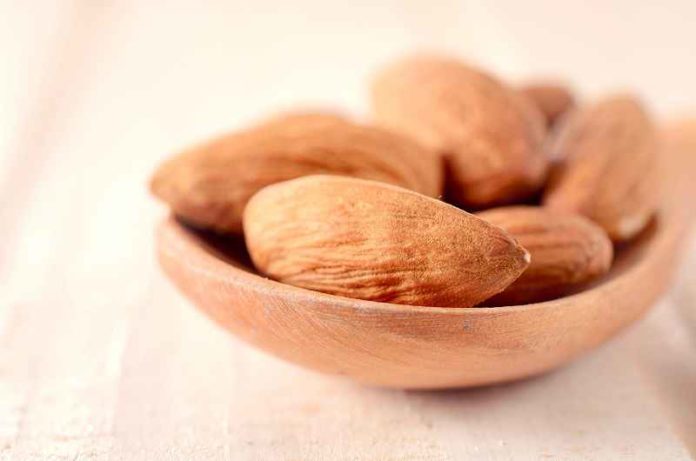To consume or not; young and old ponder. The nut’s properties can help boost brain power, shows new study.
If you want to retain cognitive function after eating lunch and perhaps lose some weight, too, you might want to consume some almonds with that meal.
Research indicates the nut’s innate properties can power-up brain function and may even help people shed a few pounds in the immediate term. Such are the findings of a 12-week clinical trial whose results were accepted in December 2016 and ultimately published in the British Journal of Nutrition.
Study participants, who agreed to adhere to its protocols, initially included 86 nonsmokers without nut allergies or other metabolic or endocrine-related problems, ages 18-60 years: 65 women and 21 men. All were considered to be overweight and obese; all were routinely counseled regarding their potential for weight loss during the trial, which observed the impact of diet on cognition during a weight loss intervention.
The study authors measured the participants’ cognitive functions at the start of the study, i.e. its baseline, and its conclusion, as well as right after eating and at its half-hour-later, post-lunch dip to determine overall figures.
The participants were divided into two 43-person groups. One group ate an almond-enriched high-fat lunch (A-HFL) while the other consumed a high-carbohydrate lunch (HCL). The HCL group consumed no nuts or its products at all. Each group member was required to eat all of the food at his or her lunch during a 15-minute period for the three-month period of the study.
Those in the A-HFL lunch bunch enjoyed portion-controlled servings of almonds, a food called SpaghettiOs and/or white bread, jelly and apple juice. This group derived about70-75% of its energy from the almonds, the study found.
Those in the HCL group ate similarly-controlled servings of SpaghettiOs, white bread, jelly and apple juice, generating 85% of their energy from carbohydrates.
After eating, each A-HFL and HCL member’s cognitive functions were immediately assessed and then again after about 30 to 35 minutes, during the so-called post-lunch dip. The cognitive tests were conducted to test immediate memory and delayed memory; and an attention and a verbal list recognition test was also performed.
In the immediate memory test, the almond-consumption, high-fat lunch participants were read a list of 10 words right after eating; then, when quizzing them two minutes later, researchers recorded the correct responses. During the post-lunch dip, the delayed memory test asked the participants to recall their 10 words and to write them down. Then, the correct word results taken immediately after eating and at the post-lunch dip were compared.
The attention test required participants to correctly notate on paper particular letters combined with a series of dashes over a four-minute period right after lunch, and the results were compared for the same exercise performed during the post-lunch-dip period.
The verbal recognition test analyzed whether each member in either group could recall a list of 10 words read to him or her right after eating, and then during the post-lunch dip, and if the person could pick out the 10 words from a list of 20.
Trial results showed that memory and performance decreased during the post-lunch dip in both groups, however, the A-HFL group experienced a 57.7% improvement in cognitive post-lunch dip scores during the 12-week study compared with the HCL group. However, overall attention scores generally remained unaffected between the two groups, the study concluded.
When data was filtered by participants’ ages, the numbers show that, while those aged 18-39 produced higher scores across the board than those in the 50-60 age bracket, the study concluded age was just “moderately correlated” with those results.
Among other findings, researchers noted that carbohydrates contain high fiber and low fats and almonds may possibly assist in memory functions. Also, after the 12-week study, participants who consumed almonds did not have improved weight loss and did not experience greater memory and attention performance.
The study mentioned the fact seven people, or 8% of its participants, left the trial for various reasons before its conclusion. Thus, that could be viewed as a potential limitation.
In another potential limitation, the study did not break out figures by race or ethnicity, only by gender. Further, the study mentions no control group was established against which to measure findings from the participant groups.
In conclusion, the researchers determined that almond consumption during lunch can be beneficial for those wanting to avoid a slump in their mid-day functions, but almond consumption may not have any impact on long-term memory or weight loss.
Written By: Susan Mercer Hinrichs, MA, MBA, CPhT



